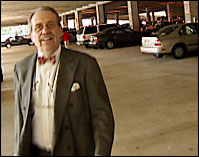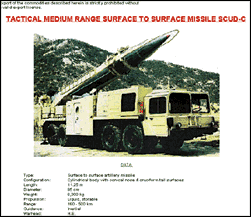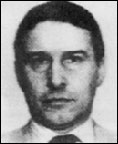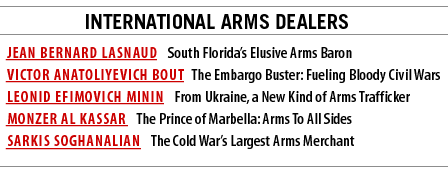|

 By Julia
Reynolds, Center for Investigative Reporting
By Julia
Reynolds, Center for Investigative Reporting
with William Kistner and Omar Lavieri in Buenos Aires

UPDATE:
Just days after the publication of this Web-exclusive report
on May 23, Jean Bernard Lasnaud was arrested in Switzerland
in response to an Interpol request. Swiss authorities contacted
the Argentina courts, where the current judge on the case quickly
requested Lasnaud's extradition. If sent to Argentina, Lasnaud
will face 22 years in prison on charges of arms smuggling and
"abuse of authority."
As this FRONTLINE/World report pointed out, the U.S.
had broken from standard practice and never took even basic
steps toward detaining Lasnaud. If he finally faces the Buenos
Aires courts, it is hoped Lasnaud's testimony will help shed
light on how a wanted international arms smuggler was able to
spend a decade living openly in the U.S.
Note: After Lasnaud's arrest, his Web site was taken off the
Internet. This story was edited on January 27, 2012 to remove the name of a person unrelated to the subject of the story.

 In
the fall of 2001, international arms broker Jean-Bernard Lasnaud
was at ease, sounding more like a seasoned entrepreneur than
a fugitive from justice. In
the fall of 2001, international arms broker Jean-Bernard Lasnaud
was at ease, sounding more like a seasoned entrepreneur than
a fugitive from justice.
"Business
has been terrible since September 11," he laughed, during a
telephone interview with FRONTLINE/World. "I'm going
to give it up and buy a hot dog stand in New York City."
Behind
his carefree appearance, Lasnaud is a most wanted man. He is
sought by Argentina and Interpol in connection with a massive
illegal arms trafficking case, and he has been formally accused
in European courts of arms smuggling and attempted fraud. Despite
nearly three years' of arrest requests from Argentinean jurists,
U.S. authorities have let him live peacefully in South Florida.
Then, in the spring of 2002, Jean-Bernard Lasnaud disappeared.
 A
French citizen by birth, Lasnaud has made South Florida his
home for more than a decade. Personable and easy-going, he was
in the business of selling tanks, rocket launchers and SCUD
missiles from a luxury condo in a gated South Florida community.
With the proper paperwork, a customer can still order a fighter
plane or a 400-bed field hospital from Lasnaud's
Web site. A
French citizen by birth, Lasnaud has made South Florida his
home for more than a decade. Personable and easy-going, he was
in the business of selling tanks, rocket launchers and SCUD
missiles from a luxury condo in a gated South Florida community.
With the proper paperwork, a customer can still order a fighter
plane or a 400-bed field hospital from Lasnaud's
Web site.
According to Lasnaud's estimate, his Caribbean Group of Companies
sells between $1 and $2.5 million of merchandise a year.
Lasnaud insisted his business is just like any other.
"Of
course I am completely legitimate," he said. "Why else would
I be selling on a Web site, where everybody can see? You can
see my licenses right there. And not just anybody can buy from
me. You have to have the proper papers, certificates approved
by the State Department."
With a sporty bow tie and an easy smile, Lasnaud does not look
the image of a shady arms dealer. In January, his name was posted
plainly at the gate of his residence near Fort Lauderdale.
"No.
I am a husband and a father," he insisted when approached at
his home for an interview. After some initial pleasant exchanges,
Lasnaud grew tired of reporters' requests and said he did not
want to discuss his arms business in South America. "That's
old news," he said.
Over the years, Lasnaud, 60, has been sought on a number of
arms-related charges - mostly allegations of embargo violations
and financial fraud - in France, Belgium and Argentina. A Belgian
newspaper reported in 1983 that Lasnaud was convicted in absentia
for illegal arms trafficking. He was sentenced to two years
in prison, but the newspaper said police could not find him.
A few years later, he showed up in the United States.
Lasnaud now stands accused in Buenos Aires courts of brokering
sales of Argentinean weapons to Croatia and Ecuador from 1992
to 1995, in violation of U.N. and international embargoes.
As a result, in 1999 Interpol issued a "red notice" for Lasnaud,
a high-priority request for immediate arrest and extradition.
"An Interpol red notice is the closest instrument to an international
arrest warrant in use today," says the U.S. Justice Department
Web site. A red notice has been issued for Osama bin Laden --
and for hundreds of accused arms dealers, murderers and drug
traffickers most people have never heard of.
For nearly three years, the Justice Department has deviated
from standard extradition procedure and has refused to arrest
Jean-Bernard Lasnaud, curiously citing lack of evidence. Argentinean
prosecutors are stunned at this refusal; a documentary trail
of faxes, money transfers and email points to Lasnaud's knowledge
and participation in the sales.
Now it may be too late for the US to arrest him. After years
of living freely in the U.S., Lasnaud appears to have gone missing.
His former attorney Kenneth Warner says he hasn't heard from
Lasnaud since March, and Warner confirms that Lasnaud has moved
out of his condo. In early May, his phone was disconnected.
Caribbean Group was handed over to the care of a Miami man named
Seyed Moghani, who says that Lasnaud is in France. "He still
owns the business," Moghani says, and customers can still place
orders via fax.
On May 14, Lasnaud told FRONTLINE/World via email, "I
am traveling out of the U.S. for the time being." He added,
"I have nothing to declare and I do not wish to answer to any
questions."
A source at Interpol headquarters in France says that travelling
internationally with a red notice is "highly unusual."
The
Argentina and Ecuador Deals
Between 1992 and 1995, Argentina's President Carlos Menem signed
several decrees authorizing sales of Argentine-made arms to
Uruguay and Panama. But the true destinations were Croatia,
which was under a U.N. arms embargo, and Ecuador, embargoed
by the 1945 Rio Accord because of its ongoing war with Peru.
>>
View a map of the arms trail
In
all, more than 6,500 tons of small arms and ammunition found
its way to wars in the Balkans and the Andes, for fees totaling
$100 million or more. Investigators estimate that half the money
went for bribes.
Witnesses testified that Jean-Bernard Lasnaud was seen at the
Port of Buenos Aires, inspecting one of the shipments bound
for Croatia. But the most significant documentary evidence against
him surfaced from Argentina's Ecuador deals.
Lasnaud is accused of brokering the sale of more than 70 tons
of rifles and ammunition to Ecuador. To facilitate the deal,
he partnered with Navy Capt. Horacio Estrada, who has been accused
of torture and murder during Argentina's "Dirty War."
It was a sweet deal gone bad. In February 1995, three shipments
of what turned out to be old and defective weapons were flown
to Quito. Rifles were missing their cleaning mechanisms and
bayonets. Boxes were stamped with recent dates, but the ammunition
was manufactured as far back as 1972.
The Ecuadorian military was outraged. Lasnaud and Estrada scrambled
to apologize. In a handwritten fax, Lasnaud and Estrada offered
Russian anti-tank missiles to make up for their faux pas. The
apology was apparently accepted, because Estrada received a
transfer of $1.85 million from the Junta de Defensa Nacional
de Quito. He had already issued a payment of $22,000 to Lasnaud
a few days earlier.
By July 1995, Ecuador tried to cancel the balance of its contract
with Lasnaud's Caribbean Group, but 9.2 million cartridges were
already on their way to Quito. This time the supplies came from
Iran, because Argentina was attracting too much press. Details
of the deal had leaked just days after the weapons landed in
Ecuador. It now appears that the Ecuador sale was an attempt
by a relative of President Menem to turn the dregs of Argentina's
arsenal into quick cash. It was a sloppy deal that thrust a
reluctant Lasnaud into the international spotlight.
 Death
of a Witness Death
of a Witness
Three
years later, in 1998, Lasnaud was home in Florida, still brokering
helicopters, small arms and anti-aircraft missile launchers
with his partner Estrada. But in August 1998, Estrada was interrogated
by an Argentinean judge for his role in the Croatia and Ecuador
sales. Estrada issued a written statement to the court insisting
that although he knew Lasnaud, they never completed a business
transaction together.
Four
days later, Estrada was found shot dead in his Buenos Aires
apartment. Police investigators ruled the death a suicide. They
found 92 email messages from Lasnaud in Estrada's computer,
all sent during the previous week and a half.
One last email message urgently requested shipment of 1,500
rifles to Sierra Leone, where arms to rebel forces have been
embargoed since 1997. Lasnaud signed off with, "Funds are available
for this operation immediately. Best Regards, Juan."
Estrada never read Lasnaud's final request. He was already dead.
"Arrest first, ask questions later"
The Lasnaud case is part of a matrix of arms sales, corruption
scandals and terrorist bombings that have helped destabilize
Argentina in recent years. It was Argentina's ongoing investigations
into those events that led to Interpol's red notice for Lasnaud.
Buenos Aires courts have looked to U.S. law enforcement for
assistance in its investigations, but the requests seem to have
fallen on deaf ears.
Six months after the September 11 attacks, U.S. Attorney General
John Ashcroft told a gathering of Ministers of Justice and Attorneys
General of the Americas that he applauded efforts to combat
arms smuggling, and he stressed the importance of mutual assistance
in extradition cases, "because only the criminals will benefit
from restrictions on our ability to cooperate." Despite the
tough talk, the U.S. has been inconsistent in enforcing weapons
laws at home. While some international arms dealers such as
Victor Bout are high-priority targets
of U.S. intelligence and law enforcement, others such as Lasnaud
don't seem to make it onto the radar screen. Typically, when
Interpol issues a red notice, the Justice Department "arrests
first and asks questions later," as one law enforcement official
put it. Standard extradition procedures are followed even in
minor cases. For instance, in 1992, a Miami resident
was handcuffed, arrested, jailed for 40 days, and voluntarily
extradited in response to an Argentinean judge's request. The
charge? Owing $76 to a client in Buenos Aires.
Argentinean prosecutors wonder, then, why the U.S. never arrested
Lasnaud, an arms dealer accused of secretly brokering weapons
smuggled around the world.
Jeffrey Denner, a criminal defense attorney who helped rewrite
the U.S.-U.K. extradition treaty, says that it is common procedure
to make an immediate arrest in such cases, because the aim is
to make sure the suspect doesn't flee.
At that point, Denner says, questioning the other country's
evidence is rare. "It's not up to us to decide whether he's
guilty under Argentinean law. There's some basic due process
that has to be covered, but beyond that, it's just not something
we look into, ever." Typically, it is only after the arrest
that the foreign evidence is examined in an extradition hearing
before a magistrate judge.
Northwestern University professor and international law expert
Anthony D'Amato says that determining "sufficient evidence"
is up to each country, but asking for it up front is rare. "There's
no particular evidence rule," says D'Amato. "When it hasn't
even gotten to the stage of a magistrate and it's just being
done by the police, nobody has to be convinced of anything --
unless, as I suspect here, the U.S. doesn't want to be convinced."
D'Amato says the procedure usually only varies when "there's
some political reason why the U.S. doesn't want to do it. Because
normally, the State Department is super-vigilant about dealing
with these cases."
"The
interesting aspect," says Jeffrey Denner, "would be whether
he's cooperating with the U.S. government or some of our allies,
and that's why they're not doing this."
U.S.
"Winked" at Arms Sales
National
interests were apparently at stake in some of Lasnaud's deals.
Dr. Daniel Nelson, a former arms proliferation consultant to
the State Department, was in Croatia during the time of the
sales. Nelson says that in the early 1990s, the US was in favor
of arming Croatia but did not want to openly violate the U.N.
embargo; instead, officials simply "winked" at weapons shipments
from Argentina, South Africa, Hungary, Slovenia, Bulgaria, Poland,
Ukraine and Iran.
"U.S.
people were engaged in trying to find sources [to get arms to
Croatia] - Islamic, and those that weren't. And Argentina was
one of those," Nelson says.
The State Department initially denied knowledge of Argentina's
embargo violations.
"[Ambassador
Peter] Galbraith and the U.S. Embassy knew about that," says
Nelson. "To suspect that they did not know about the Argentina
deals, when Argentineans were speaking Spanish in the Croatian
Defense Ministry, is ridiculous."
Galbraith later admitted that while the U.S. did not openly
endorse violating the U.N. embargo, he did tell the Croatians
to "pay attention to what I did not say. ... It was meant to
mean that we were not objecting."
Another possible explanation emerged in a recent F.B.I. investigation
of Lasnaud's son, Alexandre, for unrelated charges. In a tape
made as part of that undercover investigation, Alexandre bragged
to an informant that his father collaborated with the CIA. He
claimed he and his father were attempting to buy Chinese radar
equipment for the U.S. military.
"What
we're ordering, okay, is top secret, top secret sh-[that] the
United States Military, U.S. Air Force and U.S. Navy want,"
Alexandre Lasnaud said, according to the transcript. "But it's
not something that they publicize all over the world, saying
we are seeking this, okay? ...They talked to my dad yesterday
and they reiterate, we need this thing fast."
"It's
[not] something that the Democrats and Congress would understand
-- that the United States Army is paying people to purchase
foreign military items -- even though it's for the purpose of
training American troops."
Jean-Bernard Lasnaud is authorized to do business with the U.S.
government and he proudly publishes his Defense Logistics Information
Service license number on his Web site. "Government bids welcomed,"
reads the home page, under a "God Bless America" icon. An ownership
trace of aircraft offered for sale on the site confirmed that
at least one tanker-refueler plane is registered to the U.S.
Air Force.
A former U.S. intelligence agent stationed in Latin America
tells FRONTLINE/World he has confirmed that Lasnaud has
been a C.I.A. asset "since the Iran-Contra days," but says it
is unclear whether he still has that status.
"Lasnaud
certainly fits the profile," a former U.S. Customs official
in the Miami area agrees. "He's probably either [a C.I.A.] asset
or he's an informant for Customs or some other agency."
Sources from the criminal defense bar, the National Security
Council, U.S. Customs and intelligence agencies agree there
are only a few reasons that the Justice Department would not
follow its normal procedure when faced with a red notice: it
could be plain old bureaucratic incompetence; the subject has
been or is an active informant in a criminal matter; or he is
performing work deemed vital to U.S. national security.
For example, in 1986 agents from U.S. Customs and the Bureau
of Alcohol, Tobacco and Firearms impounded an Air National Guard
Huey helicopter found in arms dealer Sarkis
Soghanalian's hangar, bound for El Salvador. But authorities
dropped all charges. The reason, according to a U.S. Customs
source, is that Soghanalian was providing information to U.S.
intelligence.
Another
source in the U.S. Attorney's office in Miami says that when
the Justice Department does not honor a red notice in the usual
procedural manner, there "must be something else going on" related
to U.S. national security or U.S. intelligence agencies.
The
Invisible Man
Whatever
the reasons for American reluctance to arrest Lasnaud, Argentina
has not given up its effort to prosecute him. Even in the midst
of economic crisis, the arms case remains a priority. In 2000,
ex-president Carlos Menem and other top officials were investigated
and placed under house arrest for their suspected roles in the
arms deals. Although Menem was set free by a friendly Supreme
Court last November, that decision was recently overturned and
a new investigation of the former president has been ordered.
In April, former finance minister Domingo Cavallo was arrested
in connection with the arms sales. Three separate cases have
been combined into one, and the Interpol arrest request for
Lasnaud remains in force.
According to the Department of Justice Criminal Division spokesman
Bryan Sierra, the department stands by the original claim made
by the division's Office of International Affairs -- that there
is insufficient evidence Lasnaud knew the Ecuador shipments
contained weapons. Yet it seems unlikely that U.S. investigators
have not seen the fax and documents FRONTLINE/World has
obtained that indicate otherwise.
If nothing else, U.S. law enforcement's response has been confusing.
U.S. Customs weapons investigators in Lasnaud's own neighborhood
knew myriad details of the Argentina deals, but say they've
never heard of Lasnaud. Meanwhile, officials in Customs headquarters
in Washington acknowledge that they do know who he is. An assistant
U.S. attorney initially expressed interest in the case, but
after checking with colleagues said he could not meet with reporters.
"I don't know what to tell you," he apologized. "Sorry I can't
help more."
Now Lasnaud may be gone for good. A former intelligence agent
says, "The fact that he was here bothers me. The fact that he
got out with a red notice on him bothers me even more."
Dr. Graciela Abreu of the Argentinean embassy in Washington
was perplexed as to why the Department of Justice never arrested
Lasnaud. "We wanted to prevent this guy from leaving the country,"
she says. Although the Interpol notice remains in effect, Argentina
cannot request extradition without knowing where Lasnaud is.
When a cameraman for the Center for Investigative Reporting
spotted Lasnaud in a parking lot last December, he called out,
"Are you Mr. Lasnaud?" Startled, Lasnaud smiled and answered
mischievously, "But it's not me." With that, he drove off, a
bright American flag on his windshield, looking just like any
other patriot in times of terror.
Six months later, the arms baron of Ft. Lauderdale may be set
to become the target of an international manhunt.

Additional
reporting by Lowell Bergman, Allyce Bess, Dave Gilson, Marlena
Telvick, Monica Sagullo, James Sandler, Will Evans, Mabel Tampinco,
Robin Stein, Kelly Davis and Jared Saylor.
Thanks to Gerardo Reyes, Patrick Oppman, and Ralph Renick Jr.
Julia
Reynolds is a staff reporter at the Center for Investigative
Reporting and editorial director of El Andar Magazine.

NEXT:
VICTOR ANATOLIYEVICH BOUT
The Embargo Buster: Fueling Bloody Civil Wars

|

